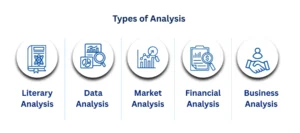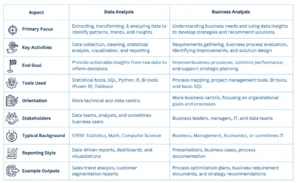The global market is undergoing a huge and rapid transformation. This transformation is majorly driven by tech-forward, new-age customer demands. With the rise of AI development services, every industry is restructuring its workflow to meet customer expectations. To remain relevant and competitive in the market, every business needs to analyze its current condition, data, and future outlook. This analysis can be done in two ways: one is data analysis, and the other is business analysis. In this blog, we shall discuss how these two terms differ and still relate to each other.
What is Data Analysis?
Data analysis refers to the process of extracting hidden information from a dataset. This data can be specific or a huge amount of unstructured data. Data analysis mainly works on numerical and statistical data. Data analysis involves techniques such as statistical analysis, data mining, and predictive modelling to discover trends, patterns, and correlations within the data. Data analysts usually work with structured data and use Python, SQL, and machine learning techniques to process this data. Data analytics is a broader concept that can be used to analyze any kind of data. This can be utilized by any field that deals with data and needs information from it.
What is Business Analysis?
Business analysis refers to the process of identifying business requirements, analyzing them, and providing effective solutions that drive business growth. Business intelligence services often use business analysis for building a strategic growth plan. Business analysis deals with business data like customer acquisition, customer churn, sales, profit margins, key performance indicators, etc. Business analysis involves analyzing company data, market conditions, and operations to identify bottlenecks and challenges and to suggest improvements. Business analysis is a business-specific process, unlike data analysis, which can be used for any field.

Key Differences Between Data Analysis and Business Analysis
Data analysis and business analysis often overlap in functions. However, the primary objective and working of these two processes are quite different from each other. Let us see how data analysis and business analysis differ from each other briefly.
Key Focus:
Business analysis is future-oriented, more strategic, and focuses on long-term results. On the other hand, data analysis is more immediate and provides short-term insights.
Objective
The primary objective of data analysis is to discover data-driven insights that can help in decision-making in any field. In contrast to that, business analysis’s main objective is to improve business revenue through enhancing systems and optimizing operations. Business process analytics also use data analytics, but the application is purely for business enhancement.
Methodologies and Approaches
Both data analysis and business analysis rely on methods like statistical analysis, data mining, and machine learning, but the difference lies in what they are used for. While business analysis uses them to predict future outcomes that can impact the company, data analysis uses them to analyze current trends, whether related or unrelated to the company.
Skillset and Expertise
Data analyst vs business analyst are two different terms often used interchangeably. Data analysis demands strong quantitative skills, knowledge of analytical tools, understanding of data manipulation, techniques, and terminologies. Meanwhile, business analysis requires an understanding of business acumen, communication skills, and problem-solving abilities. An expert business analyst should be good with stakeholder management, requirement elicitation, and business process modeling.
Contribution in Decision-Making
Data analysis plays an important role in decision-making by providing evidence-based insights to support data-driven decisions. On the other hand, business analysis facilitates business-related decision-making such as technological transformations, process optimizations, and innovation.
Deliverables
Data analysis provides reports and dashboards to visualize its findings for the stakeholders. Data analysts may be involved in ad-hoc analysis, hypothesis testing, and predictive modeling to support specific initiatives. Speaking of business analysis, they deliver artifacts such as business requirement documents, process maps, and use cases to guide project implementations for business growth.

Where Do Data Analysis and Business Analysis Overlap?
The overlap of these two technologies is both frequent and necessary at times. For instance, a business analyst needs to understand why there is a high customer churn; they will collaborate with a data analyst to visualize customer data and understand the bigger picture. The overlapping of business analysis and data analysis is like the collaboration of insights with strategy. To make use of both data analysis and business analysis together, AI development companies provide AI tools that can combine the best of both worlds and integrate analytical tools in business software. This allows real-time tracking for regular updating, and innovation as required. Get in touch with an AI development services provider that has expertise in business analytics to build a custom AI-powered dashboard for accurate insights.
Data Analysis vs Business Analysis: Which One Does Your Business Need?
Each business needs a custom plan to decide whether it needs data analysis services or business analysis services. Getting a business intelligence service can help clear your doubts and understand your business requirements better. Make sure to keep a raw checklist of your challenges and expectations ready when you talk to an AI development company. AnavClouds Analytics.ai is a reliable and reputable company with experienced experts in data science, business analysts, and artificial intelligence.
For a better understanding, read the responsibilities of a data analyst vs a business analyst and decide accordingly.
Responsibilities of a Data Analyst
The key responsibilities of a data analyst include:
- Data preparation and cleaning for uniformity and accuracy
- Conducting data analysis and using methods to find trends and patterns
- Creating and putting into practice data models and algorithms
- Making key findings visuals to distribute and discuss with stakeholders
- Working together as a team to make data-driven choices
Responsibilities of a Business Analyst
Often similar to a data analyst, the key responsibilities of a business analyst are as follows:
- Obtaining business requirements by conducting stakeholder interviews and surveys
- Recording workflows, user stories, and business processes
- Facilitating communication between technical teams and stakeholders
- After evaluating potential solutions, making recommendations while taking business requirements and constraints into account
- Project results are tracked and evaluated, and alignment with business needs is ensured.
Future Outlook and Conclusion
The future of both data analysis and business analysis is being shaped by artificial intelligence solutions. The launch of generative AI has brought significant transformation in both processes. Generative AI tools make analytical processes more accurate, speedy, and efficient. Nowadays, both data analysis and business analysis services are provided by AI development companies. The integration of AI is an efficient method for long-term returns and business growth. Book a demo with AnavClouds Analytics.ai for a detailed breakdown of your business requirements and get custom AI solutions for your business growth. Get in touch with us soon.
FAQs
How does business analysis differ from data analysis?
Data analysis focuses on extracting useful insights from raw data, while business analysis works for enhancing business growth by optimizing workflows, identifying business requirements, and proposing possible solutions.
What is better, business analysis or data analysis?
Both business analysis and data analysis are powerful tools to help make informed decisions. The main difference between them is their application. However, if you are a business owner, business analysis is your go-to solution.
What is the difference between a financial data analyst and a business analyst?
A financial data analyst works on financial data to improve investment-related decisions, while a business analyst works on the bigger picture. A business analyst will analyze the entire organizational process and suggest solutions.
How does data analysis contribute to business process analysis?
Business process analysis often leverages data analysis for specific findings, which can be used to draw deeper insights hidden in the data.



